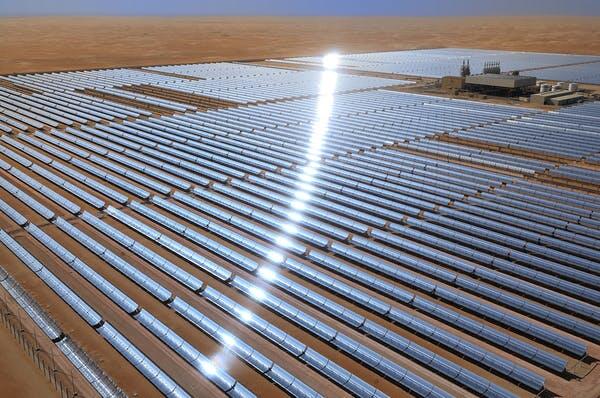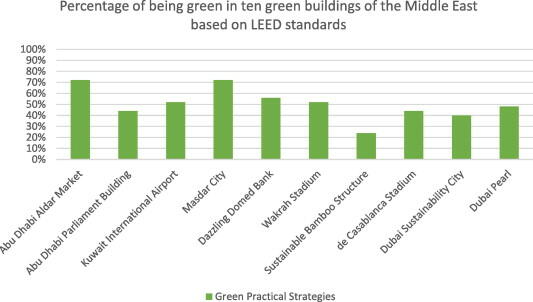Introduction
Programs aimed at stopping the threat of global warming are part of many government policies. In a number of states, authorities develop projects aimed at preventing the harmful effects of anthropogenic activities on the environment and, in particular, controlling harmful carbon dioxide emissions. According to Mezher, Dawelbait, and Tsaia (2016), the UAE is a country in which the influence of negative environmental impacts is acute due to the industrial features of development in the state and intensive oil refining. As a result, the local government addresses global warming issues and, as Patel and Griffiths (2013) note, one of the steps in creating a futuristic and advanced Masdar City.
This project is an eco-friendly location with modern energy consumption and processing system and safe living conditions. At the moment, the city is under construction, and, according to Madhu and Pauliuk (2019), it will include unique achievements in the field of the mitigation of environmental impacts. Ibrahim (2016, p. 50) states that 80% of the whole energy produced will be solar. Thus, due to innovative technologies, the Masdar City program can help minimize a dangerous environmental effect and inhibit global warming.
Challenge
One of the key challenges that underlie this issue is a wide range of tasks that are to be implemented to create a stable and reliable eco-friendly zone. According to Mezher, Dawelbait, and Tsaia (2016), the difficulty is to develop an industrial regime in which enterprises could be independent of fossil fuels that, in turn, harm the atmosphere when burned. Therefore, the relevance of the issue lies in the need to find a way of minimizing the use of traditional production technologies and move on to an advanced energy production strategy with highly effective opportunities.
In addition to the increasing threat of global warming due to the high concentration of harmful emissions in the atmosphere, some other challenges also arise as a result of increased anthropogenic activities. Cugurullo (2016, p. 2419) argues that “resource scarcity, population growth, climate change and the Arab Spring” may be the causes of the need to find strategies to address the effects of pollution.
Social difficulties and disagreements distract attention from more global issues, and the UAE government is forced to look for urgent ways of solving the problem of a steady rise in temperature. While being one of the largest oil-producing states, the country is at risk of an environmental disaster if no measures are taken. Therefore, the development of Masdar City near Abu Dhabi is one of the relevant steps aimed at demonstrating the modern capabilities and resources that the UAE possesses to solve the issue of global warming.
Solution
As a result of intensive work and the introduction of innovative technologies in both the social and industrial sectors, the Masdar City project is an objectively logical solution. To address the problem of global warming caused by the irrational use of fossil fuels, alternative power resources may be applied. One of the most weighty arguments in favor of such a program is the promotion of the use of solar energy in large quantities. Both residential buildings and industrial facilities operating through such a resource do not harm the environment and, at the same time, do not feel the need for additional power generators.
In Figure 1, an example of a plant in Masdar City is depicted, and the scale of the installation of solar panels for various needs allows evaluating how productive such a solution can be (Masdar City solar plant 2016).

This project carries several important missions that are designed to solve the problem of global warming locally in Abu Dhabi and, subsequently, become a strategy for interventions in other regions. According to Ibrahim (2016), Masdar City is supposed to be a place with zero amount of hazardous wastes and a complete absence of carbon dioxide emissions. The key changes will affect the modes of energy supply.
Traditional natural sources of fuel will be replaced by alternative ones, and solar energy is the best solution. As Patel and Griffiths (2013, p. 450) state, the estimated reduction in energy consumption by buildings in Masdar City is 56%, which is an extremely high rate. In the context of digitalization, when a large number of both industrial and individual devices are connected to the Internet, access to the network will be preserved, and people will not feel any significant changes. Mezher, Dawelbait, and Tsaia (2016) remark that in Masdar City, local energy distribution algorithms will be applied, and all buildings will be equipped with individual power supplies. Such solutions can become valuable in the context of the problem in question and minimizing its consequences.
Results
As a result of the planned work in Masdar City, this site can become one of the few worldwide residential places with a totally eco-friendly system. According to the preliminary assessment, this project is the most successful in the Middle East and has high indicators in the context of complete independence from fossil fuels and an opportunity to use alternative energy sources. In Figure 2, a ratio of ten individual major programs is presented, and Masdar City shares first place with another green project from the UAE, the Abu Dhabi Aldar Market (Green practical strategies 2014).

When assessing the results of the work conducted, one can note that not only energy but also utilization issues are addressed to Masdar City. As Patel and Griffiths (2013, p. 450) argue, about 50% of all wastes are recycled, which eliminates the need for large landfills. According to Madhu and Pauliuk (2019), through high-precision cleaning systems, valuable resources, such as aluminum or steel, are reused. In addition, life in this place is both safe and comfortable. Using advanced technological inventions, for instance, ion-lithium batteries, simplifies any technical manipulations and makes them less energy-consuming (Patel & Griffiths 2013).
Despite the fact that people will live densely, the territory of the city will be quite extensive. Madhu and Pauliuk (2019, p. 105) state that, based on the official government plan, by 2030, the territory of Masdar City will have been approximately six square kilometers. This area is not enough to protect the entire country from global warming. Nevertheless, the project of such a city is an important decision to advance the practice of protecting Abu Dhabi and the entire state from the negative consequences of anthropogenic activities.
Evaluation
The key benefit that may be achieved through the effective implementation of the Masdar City project is the reduction of harmful emissions into the atmosphere. The advantages of this program include addressing environmental challenges, using modern and high-tech developments, as well abandoning obsolete fossil fuels as the main energy resources. However, this plan may have some limitations, for instance, the lack of sufficient funds to implement all ideas due to the size of the project. In addition, since the territory of the city will have borders, a small percentage of residents of Abu Dhabi and other settlements will be able to move to this new site.
As a recommendation for further development, the relevance of engaging digital design techniques can be noted. These systems will simplify all the construction work stages and make it possible to exclude any errors when drawing up a city plan. The competent creation of Masdar City is a valuable activity that proves the interest of the UAE government in protecting the environment and stimulating innovations in this industry.
Reference List
Cugurullo, F 2016, ‘Urban eco-modernisation and the policy context of new eco-city projects: where Masdar City fails and why’, Urban Studies, vol. 53, no. 11, pp. 2417-2433.
Green practical strategies 2014. Web.
Ibrahim, I 2016, ‘Livable eco-architecture Masdar City, Arabian sustainable city’, Procedia-Social and Behavioral Sciences, vol. 216, pp. 46-55.
Madhu, K & Pauliuk, S 2019, ‘Integrating life cycle assessment into the framework of environmental impact assessment for urban systems: framework and case study of Masdar City, Abu Dhabi’, Environments, vol. 6, no. 9, p. 105.
Masdar City solar plant 2016. Web.
Mezher, T, Dawelbait, G & Tsaia, N 2016, ‘Building eco-cities of the future: the example of Masdar City’, International Journal of Thermal & Environmental Engineering, vol. 12, no. 1, pp. 1-8.
Patel, P & Griffiths, S 2013, ‘Masdar City showcases sustainability’, MRS Bulletin, vol. 38, no. 6, pp. 450-451.